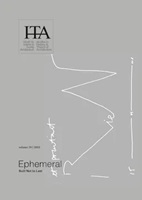The Dissimulation of the Timeless. Notes on Eisenman’s “The End of…”
The Dissimulation of the Timeless. Notes on Eisenman’s “The End of…”
Author(s): Simina Anamaria Lörincz, Florina PopSubject(s): Cultural history, Architecture, Visual Arts, Sociology of Art, History of Art
Published by: Universitatea de Arhitectură şi Urbanism »Ion Mincu«
Keywords: timeless; history; dissimulation; Peter Eisenman; contemporary architecture;
Summary/Abstract: In the mid-1980s Peter Eisenman’s essay “The End of the Classical. The End of the Beginning, the End of the End” discusses the three classical values to which architecture has resorted for the last five hundred years: representation, as the need to convey meaning through language, reason as the dependence of rationality and truth, and history as the source of timelessness. Seen as fictions, these well-established values of architecture are argued to be nothing other than “simulations,” concealed illusions that don’t recognize their condition as fictions, thus marking the reality of architecture. His theoretical model proposes the shift from simulation to dissimulation. If simulation attempts to obliterate the difference between real and imaginary, dissimulation leaves it untouched. Dissimulation is not the opposite of simulation; it is only other than. In this light, the timeless is divided from meaning and truth. It is reconstructed as a fiction recognizing its fictionality (hence the dissimulation). It has no a priori _origins, and no _a priori goals. Architecture thus becomes a “writing,” rather than an image, an invention, rather than a representation. Eisenman’s poetic model of replacing permanence in contemporary architecture falls under three non-verifiable assumptions or values (as he calls them): timeless, meaning-free, and arbitrary. However, is architecture’s transformation into a fiction — detached from a priori origins and ends, free to communicate its independent discourse and unconstrained by reason — a viable model of defying time? Contemporary architecture stands by it.In the mid-1980s Peter Eisenman’s essay “The End of the Classical. The End of the Beginning, the End of the End” discusses the three classical values to which architecture has resorted for the last five hundred years: representation, as the need to convey meaning through language, reason as the dependence of rationality and truth, and history as the source of timelessness. Seen as fictions, these well-established values of architecture are argued to be nothing other than “simulations,” concealed illusions that don’t recognize their condition as fictions, thus marking the reality of architecture. His theoretical model proposes the shift from simulation to dissimulation. If simulation attempts to obliterate the difference between real and imaginary, dissimulation leaves it untouched. Dissimulation is not the opposite of simulation; it is only other than. In this light, the timeless is divided from meaning and truth. It is reconstructed as a fiction recognizing its fictionality (hence the dissimulation). It has no a priori _origins, and no _a priori goals. Architecture thus becomes a “writing,” rather than an image, an invention, rather than a representation. Eisenman’s poetic model of replacing permanence in contemporary architecture falls under three non-verifiable assumptions or values (as he calls them): timeless, meaning-free, and arbitrary. However, is architecture’s transformation into a fiction — detached from a priori origins and ends, free to communicate its independent discourse and unconstrained by reason — a viable model of defying time? Contemporary architecture stands by it.
Journal: sITA – studii de Istoria şi Teoria Arhitecturii
- Issue Year: 2022
- Issue No: 10
- Page Range: 117-132
- Page Count: 16
- Language: English

